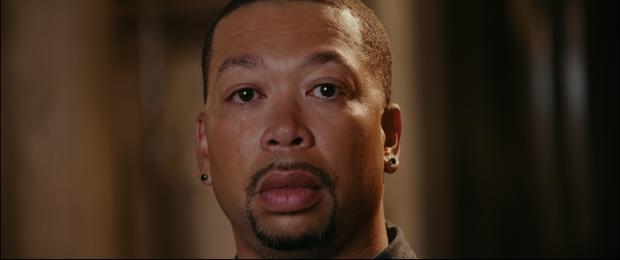Advertisement
The 32nd Pan African Film & Arts Festival, America’s largest Black-themed filmfest, took place Feb. 7 – Feb. 19 in Los Angeles. During Black History Month PAFF annually screens movies ranging from Hollywood studio productions and Hallmark Channel TV-movies to indies, foreign films, documentaries, low budget productions, shorts, animation, etc. Films span the spectrum from Oscar nominees to hard-to-find gems from Africa, the Caribbean, America and beyond that L.A. viewers are unlikely to be able to see at any other venue. Here are reviews of short films that audiences had an opportunity to see at PAFF as part of the “New Media” screening:
MOMENTS: A GROUP HUG FOR GROUP THERAPY FOR AFRICAN AMERICANS
The L.A. premiere of writer/director Malachi Rivers’ Moments shatters stereotypes regarding African Americans in his 9-episode digital series of shorts that are under 13 minutes-long each. According to Dr. Monnica T. Williams in Psychology Today: “African Americans shy away from psychotherapy as a potential solution to challenges such as depression, anxiety, post-traumatic stress disorder, marriage problems, and parenting issues. As a black psychologist, it is troublesome that so many African Americans are reluctant to make use of psychology's solutions to emotional hurdles.” (See: https://www.psychologytoday.com/us/blog/culturally-speaking/201111/why-african-americans-avoid-psychotherapy.)
The well-written, well-directed Moments thoughtfully tackles this taboo head on. In Rivers’ riveting series, the real-life Dr. Jeff Gardere – a Black mental health practitioner who has a private practice in Manhattan, is an author and TV personality known as “America’s psychologist” – portrays the therapist Dr. Winston, who presides over group therapy sessions with Black participants. In the episode entitled Nobody Knows, Rivers plays Guy Adams, a closeted gay man who is troubled by having to publicly deny his sexual identity out of fear of being stigmatized. He confides to the healing group that this inner conflict recently came to a head when his partner died, and mourners offered him their condolences for the loss of his “friend.” This roils Guy because the deceased actually meant much more to him than that – he was in fact Guy’s husband, albeit unacknowledged in public. How can Guy resolve this clash?
Stretch Marks takes on a double taboo. In addition to the above “no no” against African Americans seeking counseling, the episode’s protagonist is an aspiring artist whose dream of becoming a dancer is thwarted by society’s mundane expectations and realities. The archetype of this is the French artiste Paul Gauguin, who forsakes his family and career as a stockbroker to pursue becoming a painter at Tahiti, as depicted in movies such as 1942’s The Moon and Sixpence starring George Sanders, based on a Somerset Maugham novel. But Stretch Marks flips the script, by centering on an African American female struggling artiste.
As she relates to her healing group with flashbacks, Elaine Clemmons (portrayed by Sufe Bradshaw, who drolly played the in-charge secretary in HBO’s Veep series) is a new mother (hence, I suppose, the title Stretch Marks?) who lives in a comfortable, upper middle class home and seems well-provided for by a husband who cares about her. While many would be content with the role of motherhood and material comfort, 30-something Elaine’s current position rankles her because it means deferring her lifelong dream of becoming a dancer.
Of course, unlike painters, writers, or some others in the arts, the shelf life for dancers, who must rely upon the youthful vitality of their bodies in order to perform at their peak, is short. Elaine is painfully aware that by the time her newborn babe is grown, she’ll likely be too old to become a professional dancer – and thus, unable to fulfill her life’s ambition. Hence Elaine’s anger and frustration, which is generally reserved for white male wannabe artists in screen, stage and literary depictions. The episode is excellently acted by Bradshaw, and leaves viewers wanting more.
By extolling mental health treatment for African Americans, Moments reminds us that the next time somebody makes opposes or belittle counseling, therapy, psychoanalysis, etc., for Blacks, just remind them that one of the world’s greatest, most famous psychiatrists was the Afro Caribbean Frantz Fanon, the Martinique genius who wrote Black Skin, White Masks and The Wretched of the Earth.
THE MAHARLIKA WARRIOR: FILIPINA SUPERHERO CRIMEFIGHTER EXTRAORDINAIRE
In addition to Moments, PAFF’s New Media program included the world premiere of Hilarion Banks’ The Maharlika Warrior, which is set in urban USA with a multi-culti cast. The title character (played by Lindsay Castillo) refers to a Filipina myth regarding a female with super powers. To make a long story short, this exciting crime drama about sex trafficking and more puts a feminist and ethnic twist on conventional superhero sagas (although of course, this has been evolving in and out of the Marvel Universe). Those who enjoy movies, graphic novels and comics about crimefighters endowed with extraordinary powers far beyond those of mortal men (and women) are likely to enjoy this action-packed 54-minute film with some special FX. The Southeast Asian roots of The Maharlika Warrior from Philippines folklore makes this production unique for American viewers.
REVENGE OF THE BLACK BEST FRIEND: SPOOFING STEREOTYPES
Like the Oscar-nommed American Fiction, co-directors Thyrone Tommy and Jerome Kruin’s witty Revenge of the Black Best Friend satirically challenges and debunks big and little screen stereotypes of Blacks. Olunike Adeliyi plays Dr. Toni Shakur, who has a message for the movie and TV industry against racial tropes and one-dimensional Black characters that is delivered in highly amusing ways. The L.A. premiere of this 22-minute short was also part of PAFF’s New Media selection of shorts.
The above PAFF screenings took place at: Cinemark Baldwin Hills 15 & XD 4020 Marlton Ave., Los Angeles, CA 90008. Starting Feb. 20, PAFF has a Virtual Cinema Pass through March 31 to see some of the Festival’s film. For more info see: https://paff2024.eventive.org/films. For more info about PAFF see: https://paff2024.eventive.org/welcome.


